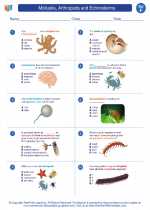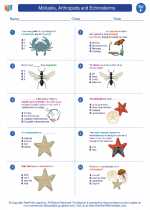Octopuses
Octopuses are fascinating creatures that belong to the class Cephalopoda, which also includes squid, cuttlefish, and nautiluses. They are known for their intelligence, unique appearance, and remarkable abilities. Let's explore the world of octopuses!
Physical Characteristics
Octopuses have a soft body with eight long tentacles, each lined with suckers used for grasping and manipulating objects. They have a bulbous head with large, well-developed eyes and a beak-like mouth at the center of their arms. Most species are equipped with chromatophores, specialized cells that allow them to change color and texture for camouflage and communication.
Habitat
These creatures inhabit diverse marine environments, from coral reefs and rocky shores to the deep sea. They are found in all the world's oceans, from the tropics to the poles, and at various depths, demonstrating adaptability to different conditions.
Behavior and Intelligence
Octopuses are highly intelligent and are known for their problem-solving abilities. They can use tools, escape from enclosures, and exhibit complex behaviors such as mimicry and play. Their advanced nervous systems and large brains contribute to their cognitive capabilities.
Feeding and Predators
As carnivorous animals, octopuses feed on a variety of prey, including crustaceans, fish, and mollusks. They are skilled hunters, using their tentacles to capture and immobilize their food before consuming it. Despite their hunting prowess, they are targeted by numerous predators, including sharks, large fish, and marine mammals.
Reproduction
Octopuses have a short lifespan, typically living for only a few years. They are solitary creatures and come together only to mate. Males transfer sperm packets to females using a specialized arm called a hectocotylus. After mating, females lay eggs in protected areas and guard them until they hatch, after which they typically die.
Conservation Status
Due to their ecological importance and vulnerability to overfishing and habitat destruction, some octopus species are facing conservation threats. Sustainable fishing practices and marine conservation efforts are crucial for preserving their populations and maintaining healthy marine ecosystems.
Study Guide
- What are the physical characteristics of octopuses?
- Describe the habitat of octopuses and their adaptability to different environments.
- Discuss the intelligence and problem-solving abilities of octopuses.
- Explain the feeding habits of octopuses and the predators they face.
- Detail the reproductive behavior of octopuses and their typical lifespan.
- Why are some octopus species facing conservation threats, and what measures can be taken to protect them?
[Octopuses] Related Worksheets and Study Guides:
.◂Science Worksheets and Study Guides Sixth Grade. Mollusks, Arthropods and Echinoderms

 Activity Lesson
Activity Lesson
 Worksheet/Answer key
Worksheet/Answer key
 Worksheet/Answer key
Worksheet/Answer key
 Worksheet/Answer key
Worksheet/Answer key
 Worksheet/Answer key
Worksheet/Answer key
 Vocabulary/Answer key
Vocabulary/Answer key
 Vocabulary/Answer key
Vocabulary/Answer key
 Vocabulary/Answer key
Vocabulary/Answer key
 Vocabulary/Answer key
Vocabulary/Answer key
 Vocabulary/Answer key
Vocabulary/Answer key
 Vocabulary/Answer key
Vocabulary/Answer key
 Vocabulary/Answer key
Vocabulary/Answer key
